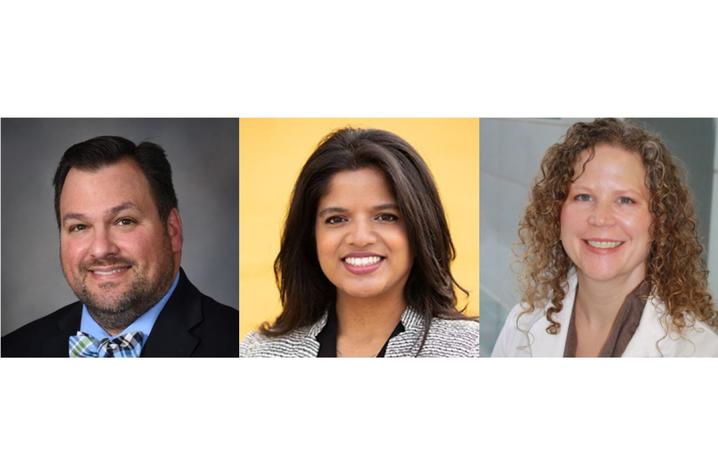DanceBlue Clinic tests intervention to reduce financial burden on patients and caregivers

LEXINGTON, Ky. (May 6, 2024) — Researchers at the University of Kentucky College of Nursing, DanceBlue Kentucky Children’s Hospital Hematology/Oncology Clinic and UK Markey Cancer Center found that receiving financial and legal navigation services improves levels of financial toxicity and quality of life for patients and caregivers.
Financial toxicity refers to the burden and stress a patient or caregiver has related to the cost of medical care. Patients undergoing cancer treatment and their caregivers often experience high levels of financial toxicity. Currently, very few evidence-based oncology financial and legal navigation programs exist to address this.
The research team’s work to evaluate the impact of such services was published in March in the journal JNCI Cancer Spectrum.
“One way to help lessen this burden is to offer social, financial and legal navigation services and resources at the point of care or at the clinic they receive care in,” said Jean Edward, Ph.D., associate professor in the College of Nursing.
Edward is a principal investigator on this interdisciplinary study with co-investigators John D’Orazio, M.D., Ph.D., chief of the Division of Hematology/Oncology at UK HealthCare and Kimberly Northrip, M.D., associate professor of pediatrics in the College of Medicine.
While investigating the best way to lessen financial toxicity, researchers at the DanceBlue Clinic decided to test a new interdisciplinary financial and legal navigation intervention for pediatric oncology patients and caregivers called FINassist (Financial and Insurance Navigation Assistance).
Using FINassist, clinic team members were trained in identifying financial and legal issues facing their patients and having conversations about the costs of care.
Utilizing financial navigators and lawyers, through a medical-legal partnership with the clinic’s social worker team, the clinic provided financial and legal navigation assistance to support pediatric, adolescent and young adult cancer patients and caregivers.
“The results show that there are resources available to help manage the costs of cancer treatment and overcome barriers to accessing care,” said Edward.
As a result of receiving these services, patients and caregivers experienced significant reductions in financial toxicity and improvements in health-related quality of life. The participants who tested FINassist rated the intervention highly for feasibility, acceptability and appropriateness. They found the intervention to be helpful and would highly recommend it to others.
FINassist also helped save roughly $335,323 in financial benefits for participants.
“The DanceBlue Clinic has one of the most robust psychosocial teams at UK HealthCare and continues to provide programs that address cancer-related financial toxicity,” said D’Orazio. “This adds to our well-rounded approach to care for our patients on a variety of levels.”
Patients and caregivers who access services at DanceBlue also have access to comprehensive healthcare services that include financial navigation among other services.
The study team included researchers from the colleges of Nursing, Medicine and Public Health, along with the Markey STRONG program and was supported in part by the Robert Wood Johnson Foundation, American Cancer Society, National Cancer Institute and National Center for Advancing Translational Sciences.
Research reported in this publication was supported by the National Cancer Institute of the National Institutes of Health under Award Number P30CA177558 and the National Center for Advancing Translational Sciences of the National Institutes of Health under Award Number UL1TR001998. The content is solely the responsibility of the authors and does not necessarily represent the official views of the National Institutes of Health.
Supported in part by ACS IRG-22-152-34-IRG and DICR POST-BACC-22-1042000-01-DPBACC from the American Cancer Society, and the Robert Wood Johnson Foundation. The views expressed here do not necessarily reflect the views of the Foundation.
UK HealthCare is the hospitals and clinics of the University of Kentucky. But it is so much more. It is more than 10,000 dedicated health care professionals committed to providing advanced subspecialty care for the most critically injured and ill patients from the Commonwealth and beyond. It also is the home of the state’s only National Cancer Institute (NCI)-designated Comprehensive Cancer Center, a Level IV Neonatal Intensive Care Unit that cares for the tiniest and sickest newborns and the region’s only Level 1 trauma center.
As an academic research institution, we are continuously pursuing the next generation of cures, treatments, protocols and policies. Our discoveries have the potential to change what’s medically possible within our lifetimes. Our educators and thought leaders are transforming the health care landscape as our six health professions colleges teach the next generation of doctors, nurses, pharmacists and other health care professionals, spreading the highest standards of care. UK HealthCare is the power of advanced medicine committed to creating a healthier Kentucky, now and for generations to come.
As the state’s flagship, land-grant institution, the University of Kentucky exists to advance the Commonwealth. We do that by preparing the next generation of leaders — placing students at the heart of everything we do — and transforming the lives of Kentuckians through education, research and creative work, service and health care. We pride ourselves on being a catalyst for breakthroughs and a force for healing, a place where ingenuity unfolds. It's all made possible by our people — visionaries, disruptors and pioneers — who make up 200 academic programs, a $476.5 million research and development enterprise and a world-class medical center, all on one campus.




